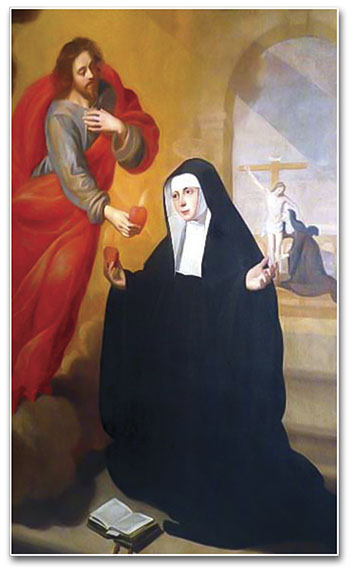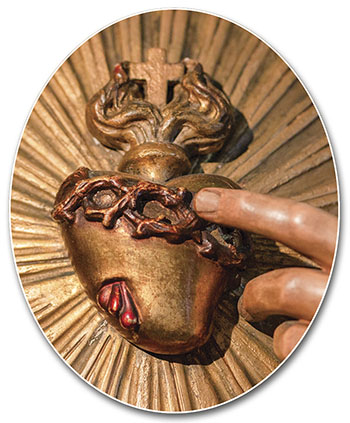In the distant year of 1182, a little girl with bright and lively eyes was born into a family in Tongres, a town in Belgium, and she was christened Lutgardis.
As her personality developed, she showed a remarkable appetite for the supernatural life and an almost experiential sense of God’s presence, which she mixed, however, with a lively taste for the pleasures of worldly vanity and human friendships. She was drawn, at one and the same time, to holy cogitations and to wearing clothes that enhanced her beauty, which was indeed exceptional.
All this, however, was nothing more than her subconscious thirst for the infinite, which can only be satisfied by God. Her heart longed for divine love, without knowing exactly what it consisted of or how to attain it. And she remained in this state of inconstancy until divine mercy deigned to come to rescue her from her misery.
From early betrothal to religious life
Lutgardis’ father, a merchant, wanted a promising worldly future for his daughter. For this reason, before she was even twelve years old, he arranged a very financially advantageous marriage for her, and collected a rich dowry for this purpose. However, the precious treasure so carefully accumulated was lost at the bottom of the sea when the ship carrying it sank…
Unable to raise a new dowry, the covetous merchant appealed to his wife, who had a separate estate, begging her to save their daughter’s profitable marriage. But she, being a pious woman, had already partly discerned the supernatural design which hung over the girl, and refused to yield her inheritance unless it was for entrance into a convent. “She bluntly declared to her little daughter that if she wanted to become the bride of Christ, she would have a dowry. Otherwise, ‘she would have to marry a cowherd.’”1
In the end, her mother’s will won out, and Lutgardis entered the Benedictine monastery of St. Catherine in Saint-Trond as a kind of postulant, where she received instruction and took part in the community’s daily routine, although without much enthusiasm for religious life.
A dangerous friendship
Now the community into which she had entered – as was sadly the case with so many others of the Benedictine Order at that time – had drifted far from its original fervour and faithful observance of the rule… Taking advantage of the situation, a young man who had become enchanted by Lutgardis’ beauty began to pay her frequent visits in the monastery. The two spent long hours in the parlour in worldly and sentimental conversations and, far from being reproached, they were imitated in this by several others in the convent.
However, this wrong behaviour was the cue that Providence was waiting for to intervene definitively in the young woman’s life. During one of these dangerous encounters, as later with St. Teresa of Jesus, Christ himself appeared to her with dazzling brightness. Directing her astonished gaze to his side pierced by the lance, He said: “Seek no more the pleasure of this affection that is unsuitable for you. Here, forever, is what you must love and how you must love; here, in this wound, I promise you the purest joys.” Lutgardis was filled with fear and love, and, roused from her folly, rebuked her friend, “Depart from me, bait of death, aliment for crime; to another love I belong.”
On that occasion, Lutgardis discovered, at last, the mysterious object of her desires. That for which she so longed and which she sought as if groping, now became known to her. Her soul, exulting with joy, could at last exclaim like the spouse in the Song of Songs: “I found him whom my soul loves” (Sg 3:4).
Freed from all worldly affections, she decided to walk the road of holiness and, defying the relaxed customs of her monastery, she voluntarily imposed on herself a routine of enclosure and solitude in order to unite herself to her new Love and to know Him more closely.
As so commonly occurs with upright souls, her companions soon became annoyed with her when they perceived in this change a reproach to the general laxity. Isolation, temptations and trials began to beset her soul. Nevertheless, Lutgardis continued to progress in fervour and her prayer life.
“I want your Heart!”
Her special intimacy with the Lord one day allowed her an attitude that few would dare to imitate.

Having been favoured with the gift of healing the smallest discomfort of those who came to her, she one day grew weary of being continually occupied in this task, which diminished her prayer time. She complained to Jesus:
“Lord, why have You given me such a grace? Now I hardly have time to be alone with You! I beg You to take it away. But give me another grace, something better!”
“What grace do you want me to give you in exchange?” Christ asked her.
Being a member of the choir, Lutgardis thought that it would be useful for her to have a miraculous comprehension of Latin and thus be able to recite the Psalms with greater devotion. And, in fact, she obtained the desired change. However, she soon felt completely frustrated again… The new insights she gained into the Office did not fill her soul.
Behind all this was undoubtedly the hand of Providence, which with wise and affectionate didacticism revealed to the heart of the nun what she really lacked. Once again she turned to the Redeemer, recognizing that these intuitions served only to hinder her devotion instead of stimulating it.
Jesus asked her:
“What do you want, then?”
“Lord,” she said, “I want your Heart.”
“Do you want my Heart?” Our Lord asked her: “It is I who want your heart.”
To which Lutgardis replied:
“Take it, my beloved Lord; but take it in such a way that through the love of your Heart, closely united to mine, I may possess my heart only in You , so that it may remain forever safe under your protection.”
Lutgardis then received a new life from Christ. He showed her His own pierced Heart, source of all grace, all love and all delights, and united her to himself, giving her His own Heart in exchange for hers. There took place between Christ and her the mystical exchange that would later take place in the life of some other Saints especially devoted to the Sacred Heart of Jesus, such as St. Gertrude, St. Matilda of Hackeborn and St. Margaret Mary Alacoque.
At that moment, the divine Love that had begun to attract Lutgardis from her infancy gave itself completely to her. And the heart of the young nun, confirmed forever in the certainty of Jesus’ infinite love for her, became a living flame of charity.
Departure for Aywières
From that time on, Lutgardis intensified her life of prayer, penance and zeal in the observance of the rule, which increased the incomprehension of several of her sisters in the community. However, after living nine year there, the brilliance of her virtues overcame the meanness of many spirits and the sisters chose her to be their prioress. Lutgardis was only twenty-three years old.
To her, receiving this new office seemed a true catastrophe… She felt that at the head of a community she would not be able to fulfil her call to contemplation. Her attention then turned to the austere Cistercian monasteries that were flourishing in the Netherlands.
The new way of life embraced in these monasteries was not only distinguished by severe mortifications and penances, but, above all, it favoured mystical contemplation and perfect union with God in a very special way. Attracted by this, Lutgardis sought the advice of a wise preacher from Liège, called John of Lierre, who recommended that she resign her position as superior and leave her Order to join the newly founded Cistercian monastery of Aywières in Brabant.
Lutgardis hesitated because the language spoken in that region was French and it would be impossible for her to understand her superiors and spiritual directors. She preferred the community of Herkenrode, situated in her own country, only a few kilometres from Saint-Trond. The Divine Redeemer, however, intervened in her decision, telling her simply:
“It is my will that you go to Aywières, and if you do not go, I will have nothing more to do with you.”
The nun left for her new destination, without consulting her community. In that beautiful and secluded panorama to the southwest of Brussels, behind the sacred walls of the Cistercian monastery, she found what she so desired.
Refuge of the afflicted and of sinners
St. Lutgardis received many mystical graces during her monastic life. However, within the brevity of an article, it would be better to recount the fruits of these graces than the graces themselves, which would be of little or no value if they did not result in authentic works of virtue.

The main effect of these heavenly favours on Lutgardis’ soul, especially that sublime exchange of hearts with the Saviour, was to instil in her a profound experience of God’s predilection for her and, as a consequence, of His love for all men.
Thus, without abandoning her seclusion and her duties, she became the advocate of sinners and the mother of all those in spiritual need, as Blessed Mary of Oignies later testified on her deathbed: “There is no one in this world more faithful to the Lord than Mother Lutgardis, or anyone whose prayers have more power to deliver the souls in purgatory. Nor is there anyone here on earth more effective in obtaining grace for sinners.”2
Likewise, no one was more generous than she in embracing the difficulties and sorrows of the other sisters. One day, a nun named Hespelende, greatly oppressed by various temptations and already on the verge of despair, sought out Lutgardis and implored her prayers. The distraught nun soon received the revelation that on Good Friday, during the adoration of the Holy Cross, the temptations would leave her, and her soul would be strengthened by grace, which is what happened.
Strong against God!
Another impressive demonstration of her zeal for souls came towards the end of her life. With failing health due to various diseases and completely blind for about nine years, Lutgardis was visited by an old friend who lived in the world. He confided that he had fallen into sin and, even after having repented and confessed, he could not regain his peace, and was downcast and unconvinced of divine forgiveness.
Lutgardis importuned Heaven with fervent prayers on his behalf, but to no avail. However, these apparent failures only served to nourish her faith, which became inflamed with a holy tenacity. Her ardent soul began “to struggle with the Lord; and when she saw at last that God persisted in withholding His mercy, she exclaimed: ‘Well then, erase, Lord, my name from the Book of Life, or else forgive this man his sin!’”3
She was sure that God would not blot out her name; she only wished to affirm to Jesus himself that His mercy is always invincible. And the Saviour, for His part, was pleased to hear the bold supplications and prayers of His spouse: “‘Behold, I have already forgiven him, because he has put his trust in you,’ Our Lord said to St. Lutgardis, ‘and not to him alone, but to all those who hope in you, and whom you love, I will also show my goodness and my love.’”4

In 1245, her magnificent trajectory of love, marked by numerous sufferings, penances, virtues and even miracles, came to an end. The Redeemer appeared to her in a comforting vision, saying that within a year she would depart this life. He then made three requests of her: that she should give thanks to God for all the benefits she had received; that she should devote herself entirely to prayers for sinners before the throne of the Father; and that she should aspire with the most intense desire to be with Him forever. Having applied herself to these things with fidelity, Lutgardis died peacefully on June 16, 1246.
“Love is repaid with love”
There are yet many other teachings that could be contemplated in the life – so rich in details – of St. Lutgardis. However, there is one aspect that is necessary for the imitation of all Christians: the docility with which she allowed herself to be transformed by the power of divine love.
The God of infinite goodness pours out torrents of affection on every baptized person at every moment. For this love to be effective, however, it must, as the mellifluous Founder of Lutgardis taught, “return to its origin, go back to its beginning and return to its source, from which it will always draw new waters to flow unceasingly.”5 This will always be the secret of all the happiness and holiness of the just.
Let us ask the Cistercian Saint that, from the splendid throne of glory where she is, she obtain for us from the Sacred Heart of Jesus the grace to love Him above all things and to the very limits of our being! ◊
Notes
1 The dialogues transcribed in this article are taken from the work: MERTON, Thomas. O que são estas chagas? A vida da mística cisterciense Santa Lutgarda de Aywières. Campinas: Ecclesiæ, 2017.
2 Idem, p.83.
3 Idem, p.205.
4 Idem, p.206.
5 ST. BERNARD OF CLAIRVAUX. Sermones sobre el Cantar de los Cantares. Sermón 83, n.4. In: Obras Completas. Madrid: BAC, 1987, v.V, p.1030.


